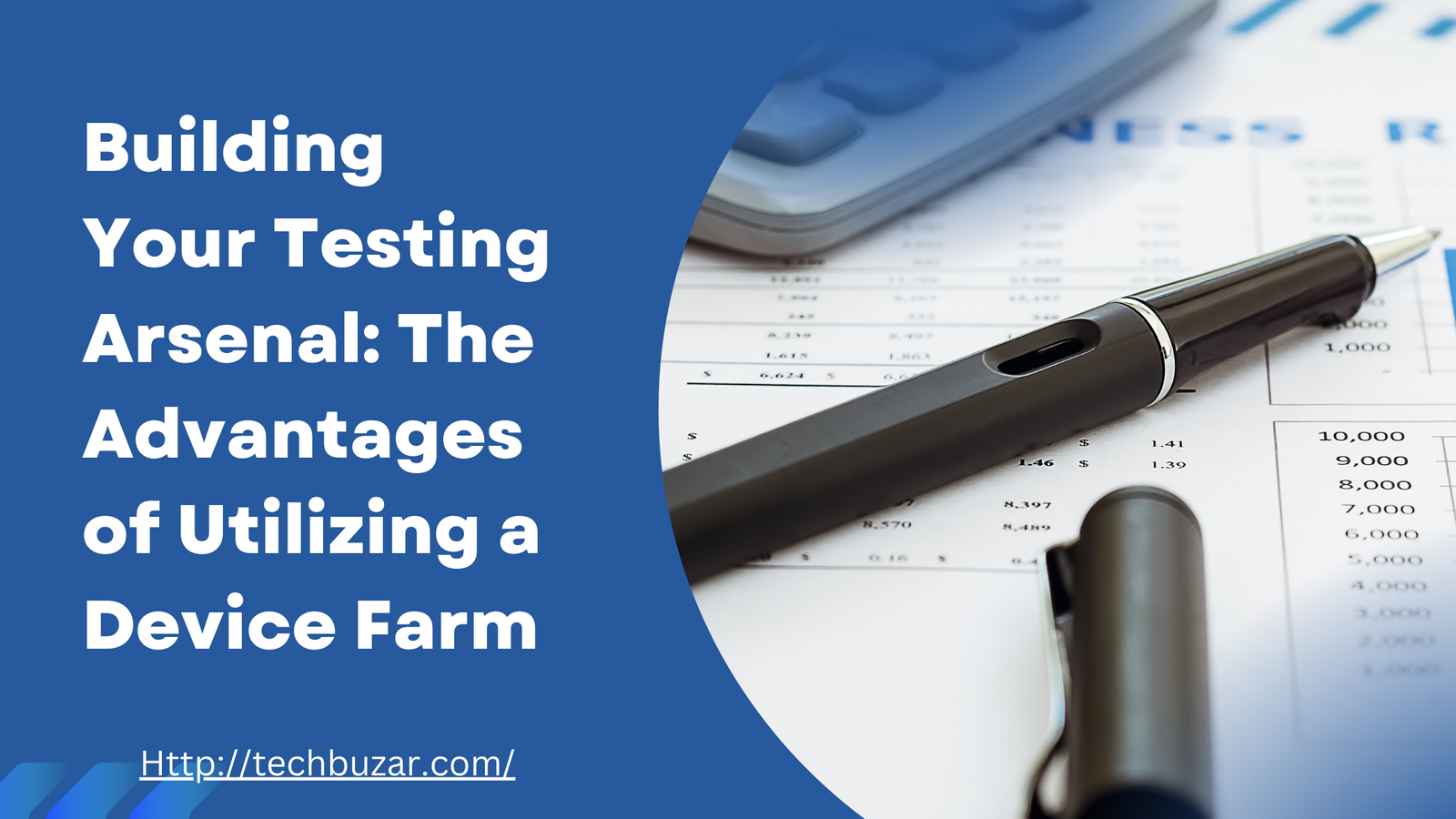
Building Your Testing Arsenal: The Advantages of Utilizing a Device Farm
Ensuring your program or app functions smoothly across various devices is essential in today’s fast-paced digital industry. The competition and stakes are very high. A minor error may result in bad feedback and dwindling user numbers. Device farms take advantage of this and change how developers test their products. But first, let’s define a device farm and discuss why you should use one in your testing toolkit.
What is a Device Farm?
Developers can test their apps across various hardware and operating systems by using a device farm service. This configuration offers a strong foundation for thorough testing and can combine physical devices, virtual computers, and cloud-based environments. By utilizing a device-farm, developers may ensure their apps run well across various hardware setups, screen sizes, and operating systems. It enhances compatibility, helps find and repair errors, and improves user experience.
Furthermore, device farms frequently provide automation tools and integration with continuous integration/continuous deployment (CI/CD) pipelines to streamline testing and expedite development cycles.
Types of Device Farms
The device farm is a service or platform that allows developers to test an application on numerous real devices. It ensures that application portability is done effectively with different hardware, operating systems, and device settings. The following are the primary types of device-farms:
Physical Device Farms
Physical device farms consist of natural, network-connected devices that can be accessed and tested remotely. Although they provide the most realistic depiction of actual usage, they can be costly to maintain. This kind of farm is crucial for verifying compatibility with various physical devices and evaluating features unique to hardware.
Virtual Device Farms
Virtual machines are used in virtual device farms to mimic devices. Although they are more accessible to scale and more affordable, they do not always accurately mimic real-world situations. Virtual devices offer a rapid and effective means of testing programs across many settings, making them valuable for initial and regression testing.
Cloud-Based Device Farms
Cloud-based device farms contain many cloud-hosted devices that can be accessed on demand, with the various benefits of a physical and virtual farm. These aspects, such as cost and flexibility, show trends toward this option’s popularity. Cloud-based farms are an excellent option for businesses to streamline their testing procedures since they let developers run tests on various devices without requiring physical hardware. One such cloud-based farm is LambdaTest. It is an AI-powered test orchestration and execution platform that lets you run manual and automated tests at scale with over 3000+ real devices, browsers, and OS combinations.
With LambdaTest, developers can quickly test their apps across various contexts by accessing a wide selection of real devices, virtual computers, and operating systems. Teams can use LambdaTest’s automation support, parallel testing capabilities, and interaction with well-known CI/CD pipelines to ensure dependable and quick testing cycles.
Furthermore, LambdaTest prioritizes security and compliance, providing teams with solid data security safeguards and support to satisfy regulatory standards.
LambdaTest also provides a user-friendly interface, smooth connections with development tools, and well-known testing frameworks like Selenium, Jenkins, and JIRA. Teams may easily integrate testing into their current workflows thanks to the simplification of test administration and execution. Teams can simply monitor test progress, evaluate results, and work together productively in a testing environment thanks to LambdaTest’s unified dashboard.
LambdaTest also offers enhanced security and performance testing functionality, enabling teams to find and fix possible weaknesses and bottlenecks early in the development cycle. By utilizing LambdaTest’s capabilities, testing teams may guarantee the delivery of resilient, high-functioning apps that satisfy the constantly changing needs of the modern digital environment.
Benefits of Using a Device Farm
There are many advantages to using a device farm, especially for testing and software development. Here are a few main benefits:
1. Access to a Wide Range of Devices
Variety:
Many devices with various operating systems, versions, screen sizes, and hardware combinations are accessible through device farms. This variety is essential to guaranteeing that apps run correctly on the full range of end-user devices.
Real Devices:
Real device testing yields more accurate findings than emulator testing since emulators frequently cannot capture all the subtleties of actual device performance.
2. Cost Efficiency
Reduced Hardware Costs:
Businesses can save money on hardware by using a device farm instead of buying and maintaining a sizable inventory of physical devices, which can be costly.
Maintenance and Upgrades:
The device farm supplier handles device replacement, maintenance, and upgrades, which relieves internal teams of some of the work.
3. Scalability
On-Demand Resources:
Device farms allow testing efforts to be scaled up or down according to requirements at any given time. This adaptability guarantees that testing can proceed faster without causing undue delays during active development phases.
Parallel Testing:
It is possible to perform many tests concurrently on various devices, which expedites the testing process and shortens the time it takes for new features and apps to go live.
4. Improved Test Coverage
Broad Coverage:
Numerous devices are available which significantly improve test coverage. By ensuring that apps are tested across various scenarios, problems that could only arise on particular devices or configurations can be found and fixed.
Geographic and Network Variability:
Device farms provide insights into performance and functionality under varying settings by enabling the testing of apps under various network and geographic conditions.
5. Enhanced Quality Assurance
Real-World Scenarios:
Testing on a wide variety of real devices rather than just emulators or a small selection of devices makes it easier to find problems and performance issues.
User Experience:
A well-functioning application on various devices improves overall user experience, increasing user happiness and retention.
6.Automation and Continuous Integration
Automation Support:
Popular testing frameworks and continuous integration/deployment (CI/CD) pipelines are frequently integrated with device farms.Testing Arsenal is integration enables automated testing, which can be scheduled to run at any time, allowing new code commits to be continuously tested.
Continuous Feedback:
Automated tests give developers rapid feedback, facilitating quicker discovery and fixing of problems.
7. Time Efficiency
Quick Setup:
Usually, setting up a testing environment with a device farm takes less time than acquiring and configuring real devices internally.
Faster Testing Cycles:
On-demand access to many devices and parallel testing greatly minimize the time needed for comprehensive testing.
8. Security and Compliance
Data Security:
Reputable device farms offer strong security safeguards to guarantee the security of the applications and data being tested.
Compliance:
Device farms can assist in meeting regulatory requirements for testing apps on many kinds of devices and conditions.
9.Global Accessibility
Remote Access:
Thanks to device-farms, which are frequently cloud-based, teams may access and test devices remotely from anywhere in the world. This is especially advantageous for teams that operate remotely.
10.Environment Consistency
Standardized Testing Environment:
Device-farms offer a reliable and regulated testing environment. Standardization lowers variability and facilitates problem reproduction and debugging by ensuring that tests are conducted consistently under the same circumstances.
Elimination of External Factors:
Device farms help ensure consistent and dependable test results by separating the testing process from local environmental variables (such as fluctuating network conditions or background processes on development machines).
11.Integration with Development Tools
Seamless Integration:
Device-farms frequently provide smooth integrations with well-known testing and development technologies like Appium, Jenkins, Selenium, JIRA, and Selenium. This integration makes test management and execution more straightforward for developers and testers and optimizes workflows.
Unified Dashboard:
Many device-farms offer a unified dashboard that allows teams to view results, track test progress, and access records. This feature improves efficiency and fosters teamwork.
12.Support for Advanced Testing
Performance and Load Testing:
Device farms can test apps’ load and performance on real devices. This assists in identifying performance bottlenecks and guarantees that the apps can withstand significant usage and traffic.
Security Testing:
Some device-farms offer advanced security testing features, enabling teams to find weaknesses and guarantee that their apps are safe from attacks.
Device farms combine cost effectiveness, scalability, improved test coverage, consistent testing environments, easy interaction with development tools, and support for advanced testing to provide a complete solution for today’s software testing demands. They help development teams guarantee dependable, user-friendly, and high-quality apps, eventually allowing the software to succeed in the cutthroat industry.
Future Trends in Device Farms
Device farms are becoming increasingly critical in today’s quickly changing technological landscape for various industries’ quality assurance and testing needs. Future trends in device-farms could look like these:
AI and Machine Learning Integration
Adding AI and machine learning to device farms is anticipated to improve automated testing, making it more intelligent and effective. AI algorithms analyze extensive test results and user input datasets, which help them spot trends, anticipate problems, and improve testing methods. Device-farms can adjust dynamically to shifting testing specifications thanks to this integration, which will increase overall test coverage.
Increasing Use of IoT Devices
Device farms will expand to include IoT devices as they become more common, providing more extensive testing capabilities. Due to their unique features and networking requirements, IoT devices require specific testing techniques. Device farms will change over time to support various IoT devices and protocols. This will enable developers to guarantee their IoT applications’ dependability, security, and compatibility in multiple contexts.
Conclusion :
To sum up, using a device-farm transforms the field of app testing. It thoroughly answers the numerous issues businesses and developers encounter in the current fast-paced digital world. Device farms guarantee comprehensive testing across a range of hardware configurations, screen sizes, and operating systems by giving access to a large number of devices, both virtual and real. This ultimately results in a better user experience by improving compatibility and helping to detect and fix issues.
Furthermore, device-farms offer advantages that go beyond improved testing effectiveness. They provide scalability through on-demand resources, parallel testing capabilities, and cost-effectiveness through lower hardware costs. Device farms allow continuous feedback loops and expedite testing processes, leading to speedier development cycles and time to market. They also seamlessly integrate into popular development tools and offer automation assistance.
Device-farms also improve quality assurance by facilitating real-world testing and offering information on performance in various network and geographical contexts. Additionally, they provide robust security measures and compliance support, guaranteeing that data and applications are protected by legal requirements.
Device farms ultimately play a critical role in propelling software success in today’s cutthroat business by assisting development teams in producing robust, high-functioning programs that satisfy customers’ changing needs. Using device farms’ capabilities will be crucial to staying ahead of the constantly evolving app development and testing scene as technology advances.


